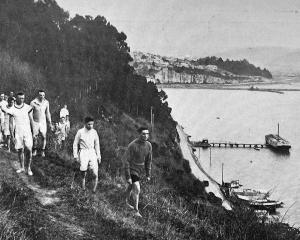In a covering letter Mr Lissaman says:- ''... I think that those who will not or cannot go to the front should do all they possibly can for those who do go; as they are going to fight our battles for us. They are giving their lives; therefore we surely can afford to give a little of our money, especially when that money is being made out of the war. We will take wool as an example. If there had been no war we should be now getting one-third less for our wool than we are getting to-day; therefore one-third of the money we are getting is the direct result of the war ... Instead of writing you a homily on the sins of wealth, which are many, I will give you a suggestion, which is as follows:- That all men, not only the big sheep farmers, but all who have wool for sale, should give 5 per cent of their wool cheque to the war funds. That amount will not hurt anyone when we consider the price we are getting. As deeds are better than words, to start the ball rolling we have much pleasure in handing you a cheque for £50 now, and will forward the balance when we get our returns, as we are shipping Home, and consequently do not know how much our wool will realise.''
• ''Women teachers do not want women inspectors'' was the statement made by Miss Coad at the Educational Institute meeting on Friday, in opposing a remit moved by a lady, that women should be appointed to inspecting positions.
''I was trying to screw up my courage to speak,'' said Mr W Foster, ''on behalf of the women teachers of Wellington, and I am glad that Miss Coad has broken the ice. This appointment of women inspectors would be a pleasant thing for the women who were appointed, but it would be a calamitous thing for the women they had to inspect. I am satisfied that the infant mistresses are treated better and more fairly by the men inspectors than they would be by women. It is a fact of human nature.''
The proposal was rejected.
• The Kaitangata correspondent of the Balclutha Free Press reports that the erection of the poles for the electric wires from the Kaitangata mine to the Castle Hill airshaft is nearly completed, and it should not be very long before the wires are taken across.
The electric wires are part of the work for the erection of a ventilation fan at the top of the shaft, and when the fan is in position it will be of the latest, up-to-date design.
There has been a serious stoppage of work at the Kaitangata No.2 mine, owing to the roof in part of the main hauling road falling in, and there has been no work in this mine since Wednesday week.
The nature of the ground at the seat of the fall is very treacherous, and the management is finding it a very awkward job to secure the roof.
The breakaway was nearly secured with timber the other day, when the whole lot came in again, and the management is now having the roof secured with steel rings.
It may be some time yet before the repair work to the roof is completed.
• The monthly meeting of the Clutha branch of the New Zealand Farmers' Union was held at Balclutha on Saturday.
After a general discussion the following resolution was carried:- ''That, owing to labour trouble, the Government be approached with a view to assisting farmers to erect workers' dwellings on the farms to facilitate the employment of married men, and this branch expresses its feeling that it view with contempt the action of some people in advertising for married couples `without encumbrance'.'' - ODT, 1.12.1915.
• COPIES OF PICTURE AVAILABLE FROM ODT FRONT OFFICE, LOWER STUART ST, OR WWW.OTAGOIMAGES.CO.NZ












